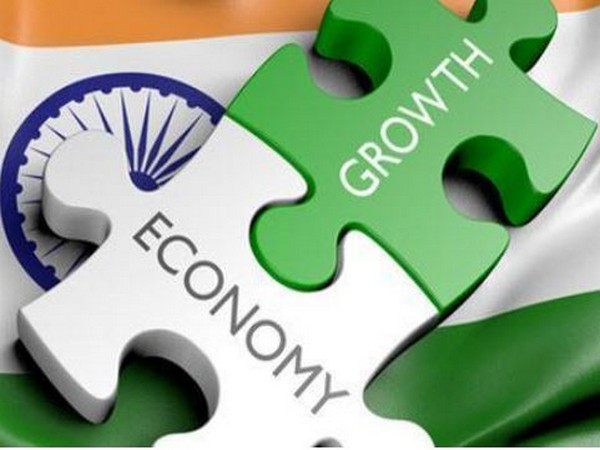Surpassing expectations and Reserve Bank of India projections, India’s GDP in the July- September quarter of 2023 (Q2 FY24) registered a robust growth of 7.6 per cent year-on-year, led by a double digit surge in manufacturing sector — despite the headwinds to exports — and an upswing in the key infrastructure sector growth of 12.1 per cent in October, shows the latest Government figures on Thursday. India’s GDP grew 6.2 per cent in the corresponding quarter of FY23. The RBI had maintained real GDP growth for Q2 at 6.5 per cent.
According to the official statement, “real GDP or GDP at Constant (2011-12) Prices in Q2 2023-24 is estimated to attain a level of Rs 41.74 lakh crore, as against Rs 38.78 lakh crore in Q2 2022-23, showing a growth of 7.6 per cent.” The GDP growth for the September quarter showed a mild easing from 7.8% in Q1 FY2024.
Prime Minister Narendra Modi said in a post, “The GDP growth numbers for Q2 display the resilience and strength of the Indian economy in the midst of such testing times globally. We are committed to ensuring fast paced growth to create more opportunities, rapid eradication of poverty and improving ‘Ease Of Living’ for our people.”
For Q2 FY24, the GDP growth has exceeded expectations, including that of analysts who had pegged it between 6.5 per cent and 7.1 per cent y-o-y. The Finance Ministry said that the real GDP growth of 7.6 per cent in Q2 FY2023 has surprised on the upside by not only being higher than the median projections of 6.8 per cent by professional forecasters but also their highest estimate of 7.4 per cent. “After a strong growth of 7.8 per cent in the first quarter, the second quarter too surprised on the upside with 7.6 per cent growth. This takes the first half GDP growth to a robust 7.7 per cent,” noted Dharmakirti Joshi, Chief Economist, CRISIL. Aditi Nayar, Chief Economist ICRA, also agreed that the y-o-y growth in India’s GDP considerably surpassed the rating Agency’s 7.0 per cent and the consensus estimate for the quarter.
The uptick was largely dominated by the manufacturing sector, with growth surging to 13.9 per cent in Q2 from 4.7 per cent in Q1. The performance of the manufacturing sector has been driven by the robust performance of the steel and cement sector due to strong demand from the infrastructure sector, lower inputs costs and importantly, steady domestic consumption demand in sectors such as automobiles.
India’s key infra sectors demonstrated strong growth of 12.1 per cent in October 2023 against 0.7 per cent expansion in the year-ago period. All the sectors except for fertiliser recorded healthy production growth in the month under review. Cement production increased by 17.1 per cent in October, 2023 over October, 2022, coal production increased by 18.4 per cent, electricity generation increased by 20.3 per cent and steel production increased by 11.0 per cent in October, 2023 over October, 2022.
Pushing up the core sector growth, crude oil production increased by 1.3 per cent in October, 2023 over October, 2022, natural gas production increased by 9.9 per cent and petroleum refinery production increased by 4.2 per cent in October, 2023 over October, 2022.
Gross fixed capital formation (GFCF), which is an indicator of investment activity in the country, jumped 11.04 per cent during Q2FY24. The share of GFCF in GDP in Q1FY24 was 29.3 per cent which has increased to 30.0 per cent in Q2FY24, which is also higher than the share of 29.1 per cent in Q2FY23, the Finance Ministry. However, the consumption data is modest with the private final consumption expenditure growing by only 3.1 per cent yoy, reflecting a weak rural demand and underlined by a low growth in the agricultural sector at 1.2 per cent.
Other official data relating to the monthly review of accounts of the Government up to October, 2023 for FY2023-24 shows receipt of ₹15,90,712 crore (58.6 per cent of corresponding be 2023-24 of total receipts). This comprises ₹13,01,957 crore tax revenue (net to centre), ₹2,65,765 crore of non-tax revenue and ₹22,990 crore of non-debt capital receipts. Non-debt capital receipts consists of recovery of loans ₹14,990 crore and miscellaneous capital receipts of ₹8,000 crore.
The Government has transferred ₹ 5,28,405 crore to state governments as devolution of share of taxes up to this period which is ₹ 93,966 crore higher than the previous year. The total expenditure incurred is ₹ 23,94,412 crore (53 per cent of corresponding BE 2023-24), out of which ₹ 18,47,488 crore is on revenue account and ₹5,46,924 crore is on capital account. Out of the total revenue expenditure, ₹5,45,086 crore is on account of interest payments and ₹2,31,694 crore is on account of major subsidies.























